Beagles, with their lovable demeanor and expressive personalities, are known for their propensity to howl. If you’re a proud owner of a Beagle and wish to encourage this endearing behavior, fret not! With a bit of understanding, patience, and the right approach, you can nurture your Beagle’s howling instincts.
Understanding the Howling Instinct in Beagles
The Nature of Beagles
Beagles are sociable and gregarious by nature. As pack animals, they rely on vocalizations, including howling, to communicate with their pack members. Understanding their inherent social instincts is key to encouraging howling behavior.
The Howling Instinct: Why Do Beagles Howl?
Beagles howl for various reasons, ranging from seeking attention and expressing excitement to responding to external stimuli or signaling distress. By comprehending the motivations behind their howling, you can effectively encourage and manage this behavior.
Establishing a Strong Bond with Your Beagle
Importance of Bonding
Building a strong bond with your Beagle fosters trust and enhances communication. Spend quality time engaging in activities your Beagle enjoys to strengthen your relationship.
Building Trust and Comfort
Create a nurturing environment where your Beagle feels safe and secure. Establishing trust and comfort encourages them to express themselves freely, including through vocalizations like howling.
Encouraging Howling Through Play and Imitation
Playful Interaction
Engage your Beagle in interactive play sessions that stimulate their natural instincts. Incorporate toys and games that encourage vocalizations, thereby promoting howling behavior.
Imitating Howling Sounds
Lead by example by imitating howling sounds yourself. Beagles are adept at mimicking human behavior, and your imitation may prompt them to join in or respond with their own howls.
Using Howling Triggers and Cues

Identifying Triggers
Observe your Beagle’s behavior to identify triggers that prompt howling. These triggers could include specific sounds, such as sirens or other dogs’ howls, or certain actions that excite or stimulate them.
Associating Cues with Howling
Introduce cues or commands that signal your Beagle to howl. Consistently associate these cues with the desired behavior, reinforcing the connection between the cue and the act of howling.
Positive Reinforcement and Reward-Based Training
Importance of Positive Reinforcement
Positive reinforcement is a powerful tool in shaping desired behaviors. Use praise, treats, or affection to reward your Beagle whenever they howl, reinforcing the behavior and encouraging repetition.
Using Treats and Affection
Offer treats and affection as rewards for howling on command or exhibiting spontaneous vocalizations. The positive association with rewards strengthens the likelihood of your Beagle repeating the behavior.
Being Patient and Persistent
Understanding the Process
Training your Beagle to howl requires patience and persistence. Understand that learning takes time, and progress may be gradual. Remain consistent in your training efforts.
Consistency is Key
Consistency in training methods and reinforcement is crucial for success. Stick to a routine and remain patient, as consistency helps your Beagle understand what is expected of them.
Seeking Professional Guidance if Necessary
Consulting a Veterinarian or Trainer
If you encounter challenges or behavioral issues during training, don’t hesitate to seek professional guidance. A veterinarian or certified dog trainer can provide expert advice tailored to your Beagle’s specific needs.
Understanding Behavioral Issues
Be mindful of underlying behavioral issues that may affect your Beagle’s ability to howl. Anxiety, fear, or medical conditions could hinder their willingness to vocalize. Addressing these issues with professional help ensures a positive training experience.
Conclusion
Encouraging your Beagle to howl can be a rewarding journey that strengthens your bond and enhances their natural behaviors. By understanding their instincts, employing positive reinforcement, and being patient, you can nurture this endearing aspect of their personality.
FAQs
Is it normal for Beagles to howl?
Yes, howling is a natural behavior for Beagles and is often a means of communication and expression.
Can I train my Beagle to howl on command?
Yes, with patience and consistent training, you can teach your Beagle to howl on command using positive reinforcement techniques.
Why isn’t my Beagle howling?
Several factors, including lack of stimulation, environmental influences, or underlying health issues, could contribute to your Beagle’s reluctance to howl. Consulting with a professional can help identify the cause.
Are there certain times when Beagles are more likely to howl?
Beagles may howl more during times of excitement, loneliness, or in response to specific triggers, such as sirens or other dogs’ vocalizations.
Should I be concerned if my Beagle howls excessively?
While occasional howling is normal, excessive or persistent howling could indicate underlying issues such as anxiety or distress. If you’re concerned, seek guidance from a veterinarian or behaviorist.
